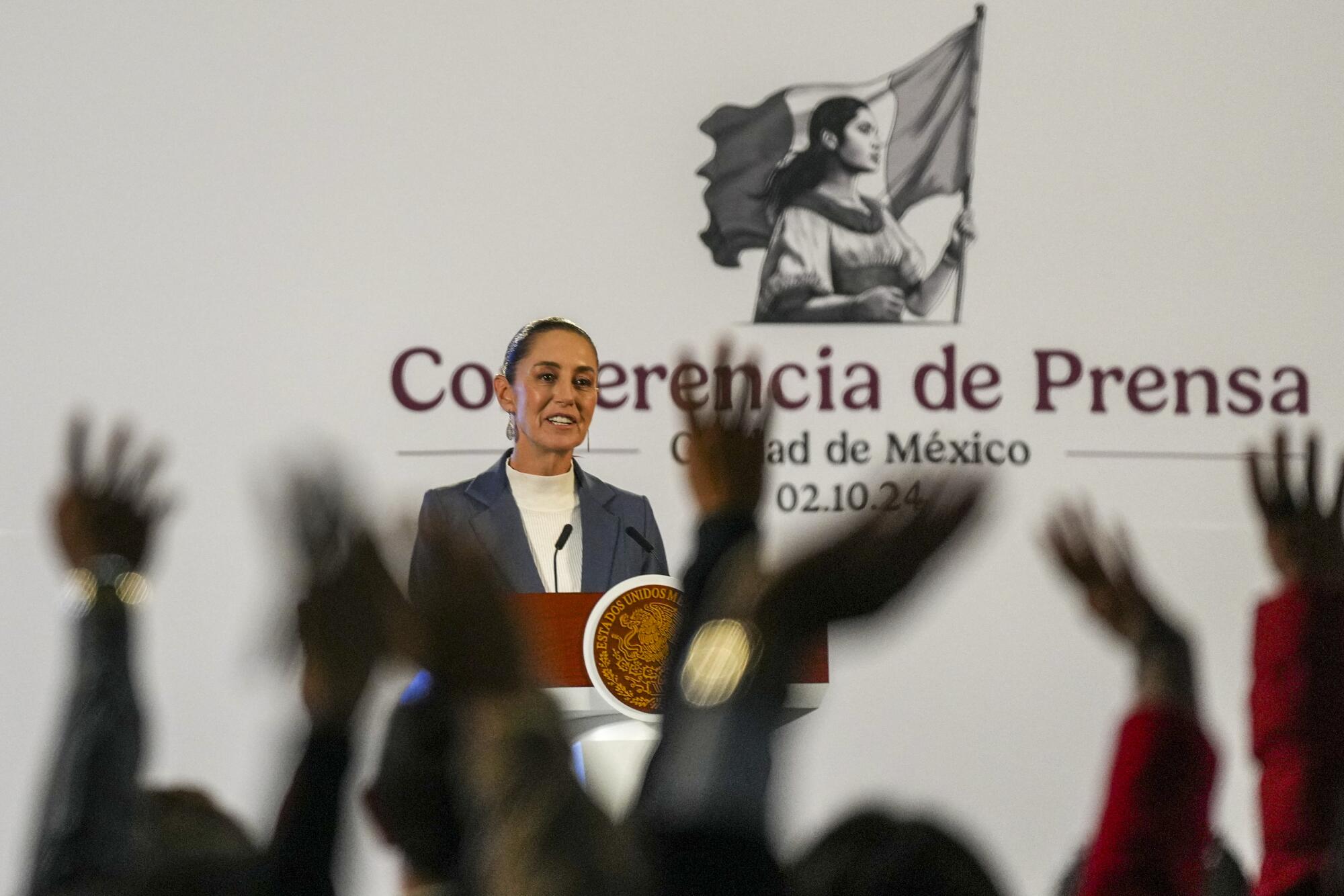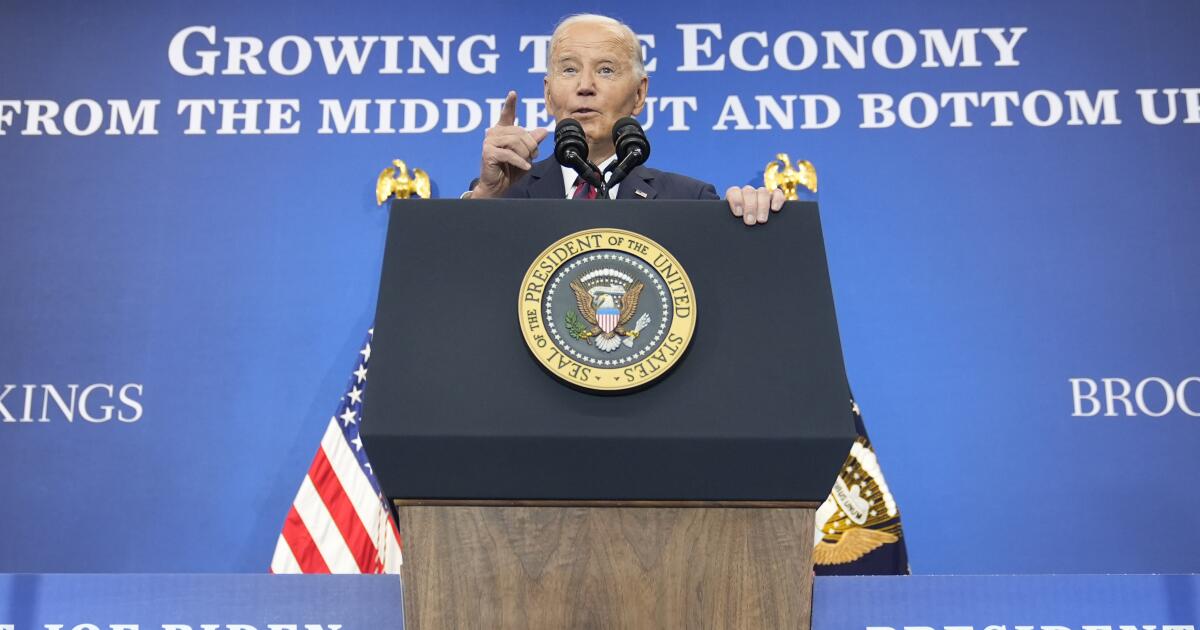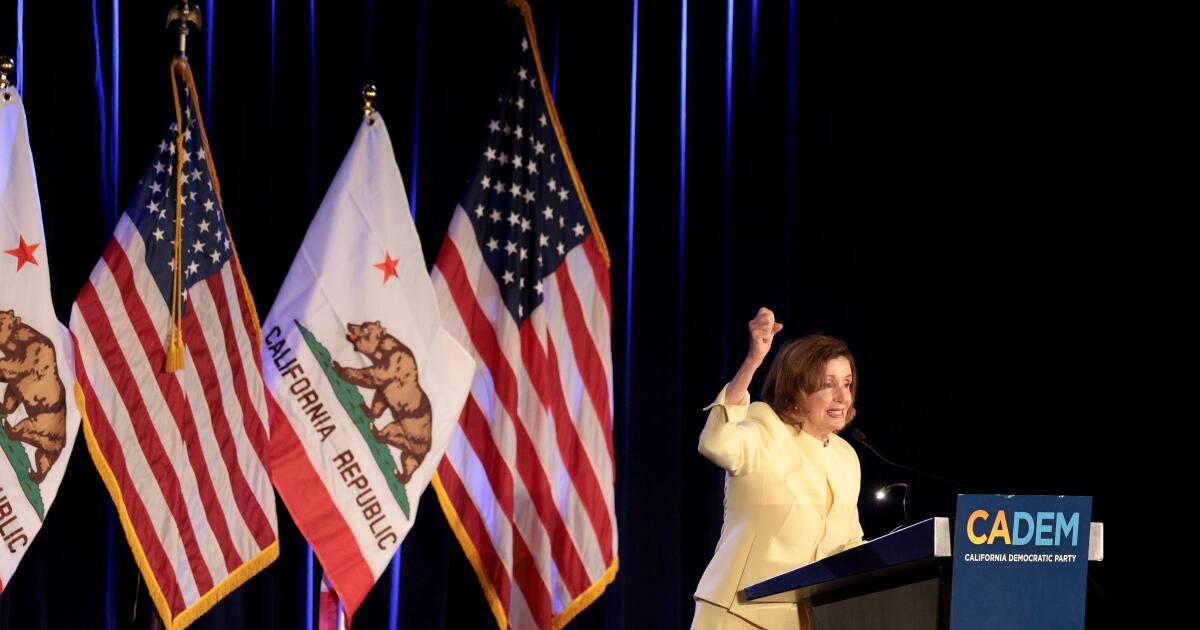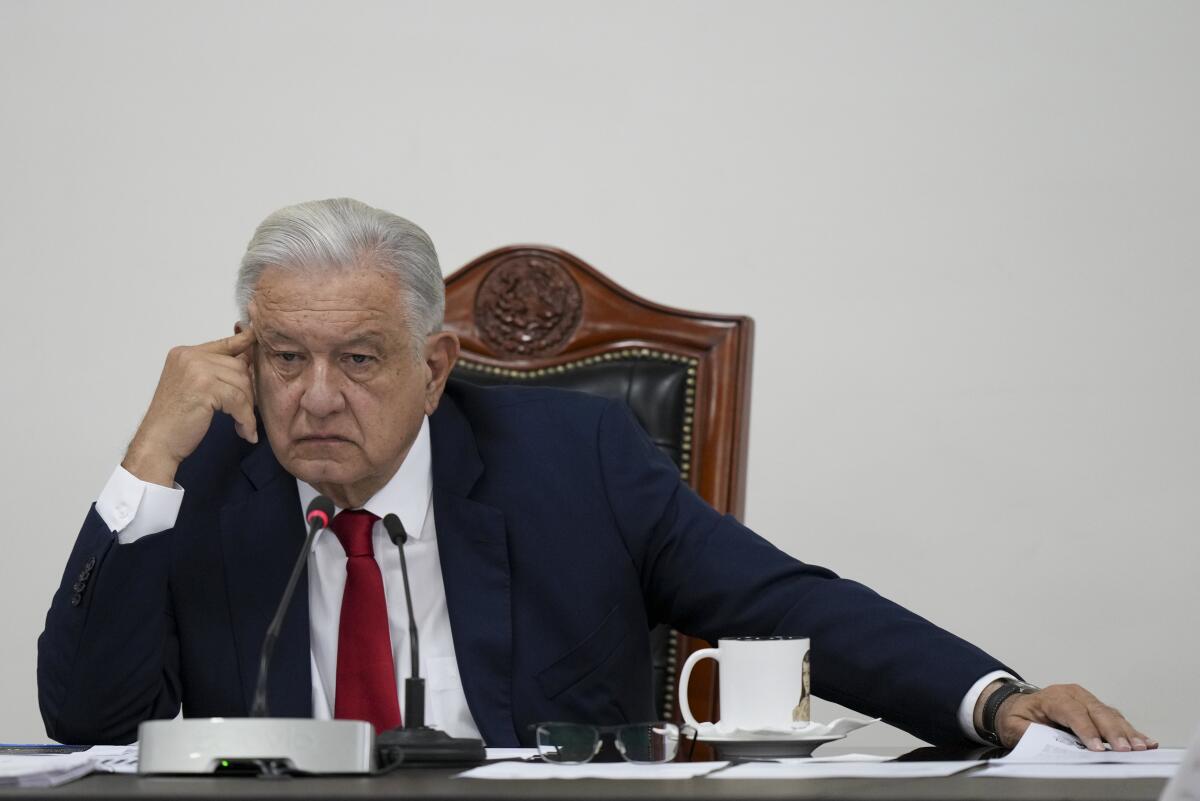MEXICO CITY — In recent days, Mexican President Claudia Sheinbaum has touted her country’s largest-ever seizure of fentanyl and highlighted multiple crackdowns on migrants headed toward the United States.
She was speaking to the press, but her most important audience is U.S. President-elect Donald Trump.
Her campaign is widely seen as a desperate effort to head off his pledge to impose a 25% tariff on Mexican goods when he takes office next month.

Mexican President Claudia Sheinbaum gives a media briefing at the National Palace in Mexico City on Oct. 2, a day after she took office.
(Fernando Llano / Associated Press)
“The timing is no coincidence,” said Eduardo Guerrero, a security analyst in Mexico City. “President Sheinbaum’s agenda has changed radically with the triumph of Trump and with the threats he directed at Mexico.”
There is deep anxiety here about the potentially devastating impacts of tariffs on an already sluggish economy that is heavily dependent on trade. The United States accounts for more than 80% of Mexico’s exports.
“They were clearly not prepared for Trump winning the way he won, and Trump saying the things he has said since the election,” said Jorge Castañeda, a former foreign secretary. “So they are doing what they can to catch up, a little on the fly. To make Trump and the Americans in general feel like she is trying to do things to make Trump happy.”
A telephone conversation between the two leaders didn’t seem to help. An elated Trump reported after the call on social media that Sheinbaum had “agreed to stop Migration through Mexico” and had committed to “effectively closing our Southern Border.”
Sheinbaum disputed that, saying that Mexico’s position was not to close borders, but “to build bridges between governments and communities.”

A boy looks through a border wall into California from Tijuana on Nov. 26.
(Gregory Bull / Associated Press)
Mexican officials have been enlisting U.S. corporations, politicians and others to help dissuade Trump from imposing tariffs.
“It’s better for Mexico to know about the tariff threat beforehand,” said Sofía Ramírez, who heads the economic think tank México, ¿cómo vamos? “This way they can at least formulate a response.”
Officials even launched a highly publicized offensive against contraband goods from Asia, raiding a shopping center in downtown Mexico City and seizing thousands of toys and other products — an operation widely seen as a preemptive strike to discourage Trump from trying to punish Mexico for serving as a conduit for Chinese merchandise headed to the United States.
Sheinbaum “realized that China is a big deal for Trump, and if she wants to stay on his good side, Mexico has to do more to prevent China from using Mexico as a back door to get into the U.S. market,” said Denise Dresser, a columnist and political scientist at the Autonomous Technological Institute of Mexico.
The president has denied that she is simply trying to placate Trump. Mexicans, she recently told reporters, “can be sure that we are never going to bow our head or be ashamed.”
Sheinbaum must walk a fine line between her constituents, who don’t want to see Mexico humiliated — or go broke — and the unpredictable, impetuous Trump. Few expect Sheinbaum, a scientist of austere demeanor, to secure the kind of rapport with Trump enjoyed by her predecessor, Andrés Manuel López Obrador, a folksy, old-school populist who showered Trump with praise at every opportunity.
“She is not going to go and campaign for Trump in the Rose Garden,” said Dresser, recalling López Obrador’s 2020 visit to the Trump White House. “He’s not going to call her, ‘Mi amiga Claudia,’ or sit and drink tequilas with her.”
Trump views tariffs as a way to pressure countries to do what he wants. In issuing his threat against Mexico last month in a post on his social media platform, he wrote: “The Tariff will remain in effect until such time as Drugs, in particular Fentanyl, and all Illegal Aliens stop this Invasion of our Country!”
It didn’t take long before Sheinbaum started trotting out accomplishments in those areas.
On Dec. 4 — nine days after the tariff threat — Sheinbaum announced the seizure of more than a ton of fentanyl in two raids in the state of Sinaloa, a notorious cartel bastion and manufacturing hub for the synthetic opioid.

Members of the Mexican National Guard conduct vehicle inspections at a new checkpoint at the San Ysidro Port of Entry in Tijuana on Nov. 29.
(Carlos Moreno / Getty Images)
The haul could have produced 20 million doses of fentanyl and yielded more than $400 million for organized crime, she told reporters.
The operation, she said, had been planned for some time, countering suggestions in the Mexican media that it had been stage-managed to win over the Trump team.
Completely shutting down the fentanyl trade is probably not possible, according to experts. Smugglers ship precursor chemicals from China to Mexico, where the opioid is produced in clandestine labs, before being transported across the U.S. border.
It’s not clear whether Trump will be willing to compromise.
“We don’t really know what Trump wants other than these blanket statements to ‘stop the drugs,’ ” Castañeda said. “Does he want to send in more DEA guys? More military? To go after kingpins again? Or go after shipments of the precursor chemicals coming in from China?”

Northbound migrants walk along a highway in the state of Chiapas on Oct. 22, hoping to eventually reach the United States.
(Edgar H. Clemente / Associated Press)
On migration, Sheinbaum has said that northbound migrant caravans were being “dealt with” — Mexican authorities have been breaking up the groups in southern Mexico.
Mexico has been detaining more than 5,000 migrants a day, almost 50% more than during the final months of her predecessor’s term. This year, Mexico has reported more than 1.2 million apprehensions of migrants — a record for Mexico that even tops the total arrests by the U.S. Border Patrol along the U.S.-Mexico border during the same period.
Will that be enough to mollify Trump? No one knows.
“Both governments are kind of condemned to deal with each other,” Castañeda said. “There’s not much choice. She can’t make Trump go away and he can’t make her go away. So they will eventually get along.”
Times special correspondent Cecilia Sánchez Vidal contributed to this report.



